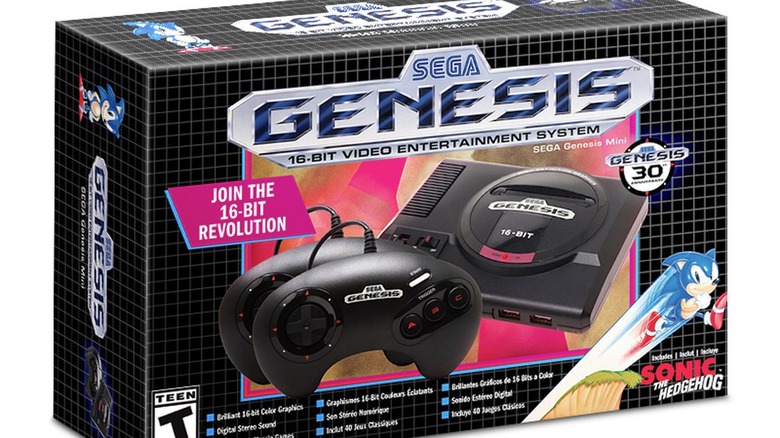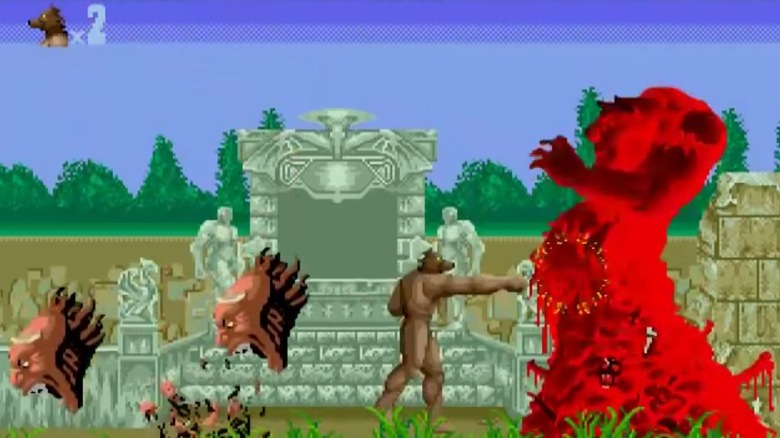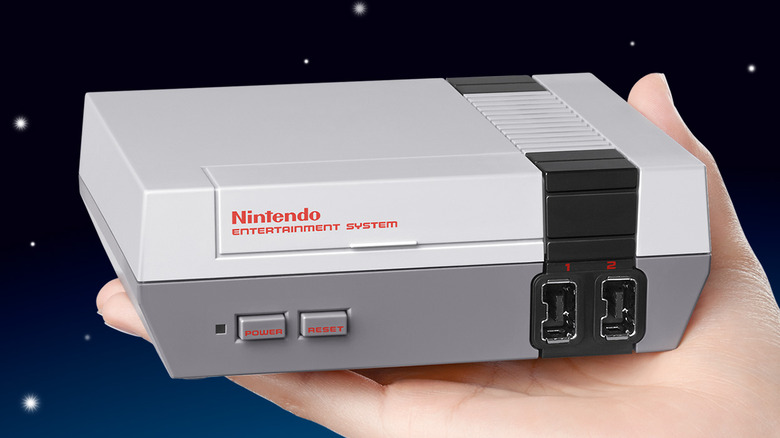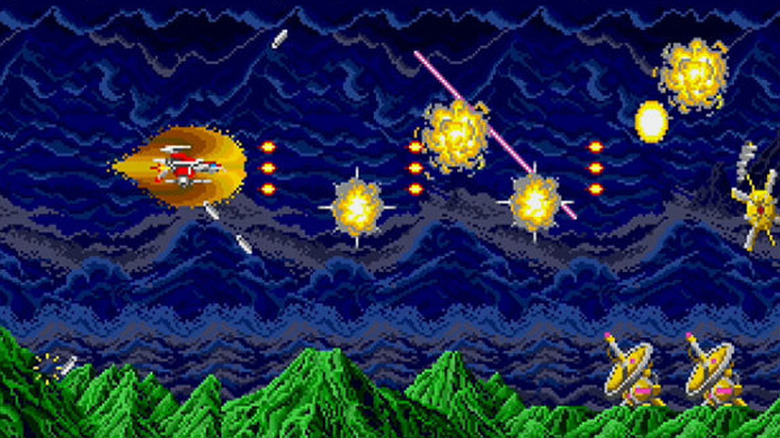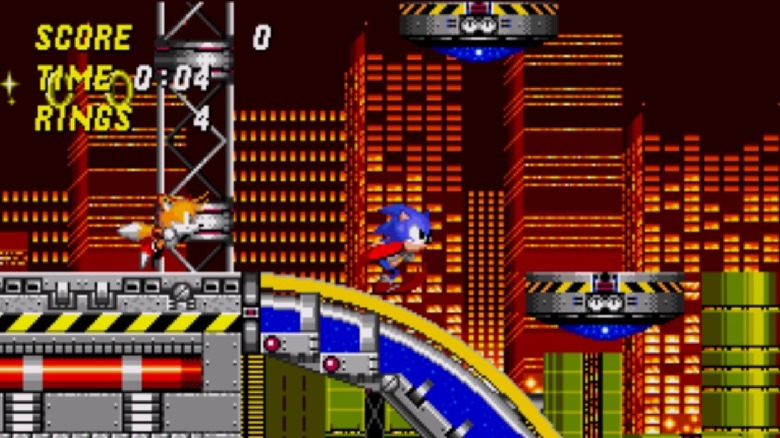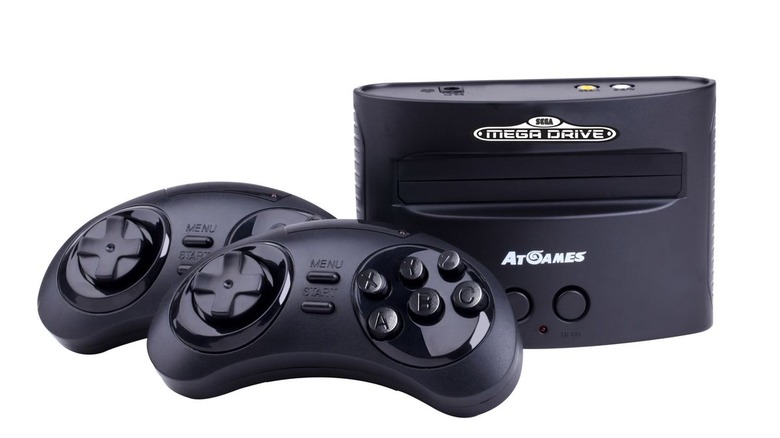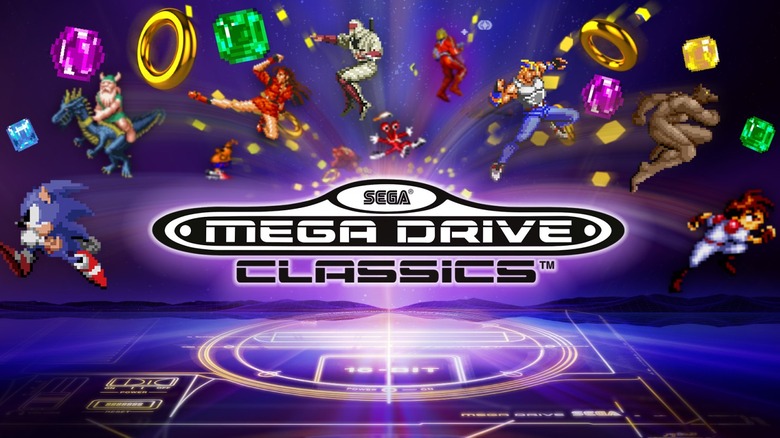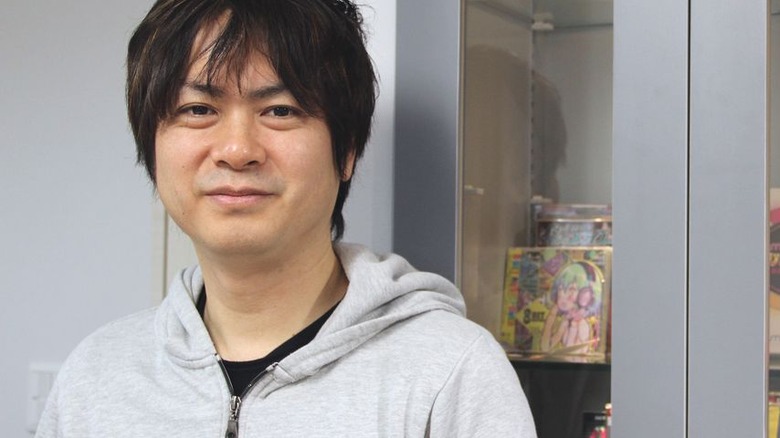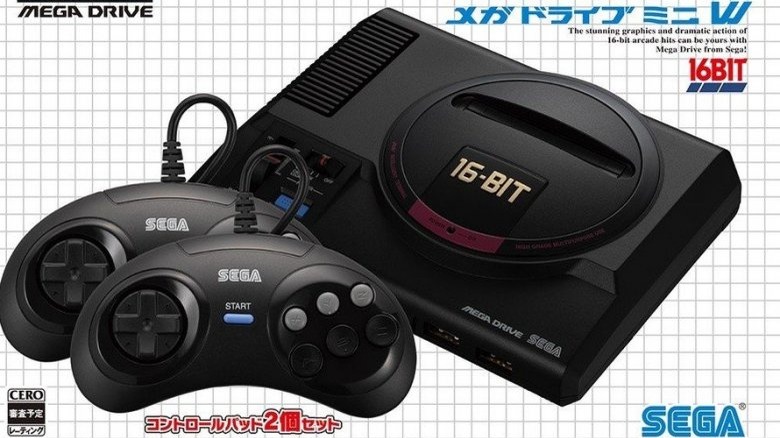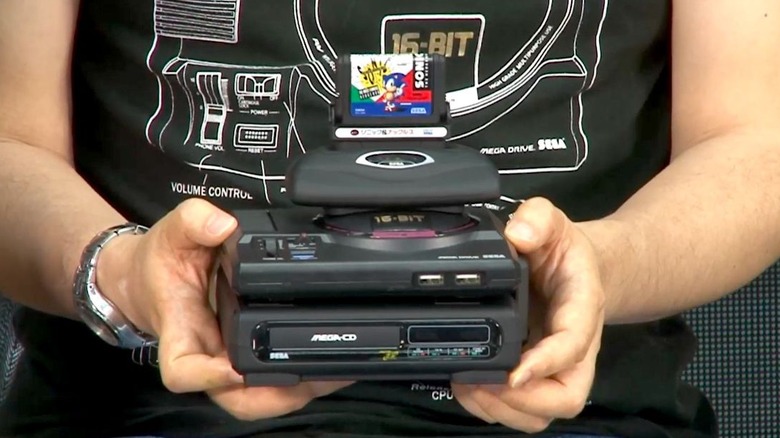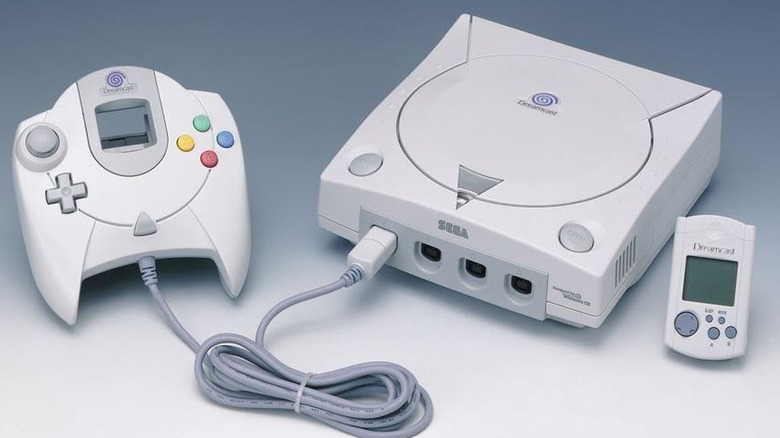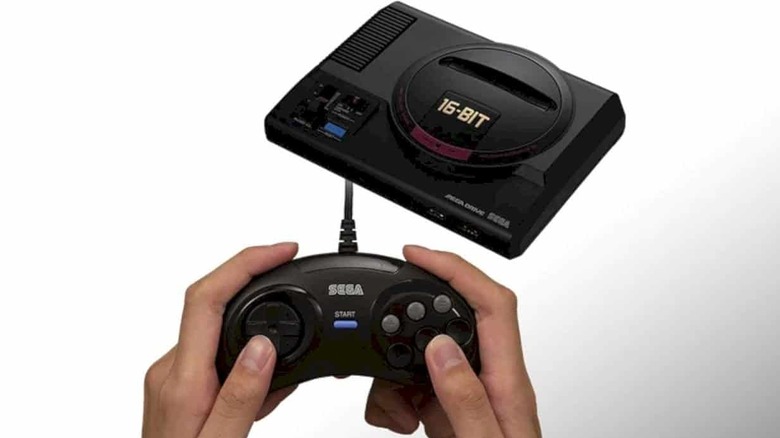Read This Before You Buy The Sega Genesis Mini Console
Everything old is new again. Originally announced as the Mega Drive Mini back in the spring of 2018, presumably as a tie-in to the 30th anniversary of the original Sega Mega Drive's release in Japan, it was later announced that the system would be put on hold until 2019. This naturally caused some skepticism as to the mini-console's quality, but it was revealed by Sega that the delay was due to the company wanting "to review the console's design and hardware." They also announced their intent to release the North American version of the mini-console under the Sega Genesis name, with the rest of the world receiving it with the Mega Drive title intact.
The Sega Genesis Mini is finally coming to stores Sept. 19, 2019. Beyond Sega's insistence on focusing on quality over rushing to meet a 30th anniversary street date, there are plenty of other reasons to be excited for the console's arrival. Let's take a look at what comes with this neat little machine, what kind of work is going into making it, and some of the gaming industry's previous attempts at appealing to the nostalgic sweet spots of gamers everywhere.
The Genesis of nostalgia
For a certain generation of gamers, the Sega Genesis immediately encourages excited nostalgia. A lot of that likely has to do with the mindset surrounding the console's hype back in the day. Its early marketing embraced the rebellious nature of the late '80s and early '90s, proudly proclaiming, "Genesis does what Ninten-don't" — maybe one of the all-time best (and most hilariously aggressive) console slogans. The lineup of games somehow seemed cooler than Nintendo's: the likes of Altered Beast and Sonic the Hedgehog seemingly embraced a harder, more "radical" edge than Nintendo's cutesy Ice Climbers and the like. When the Super Nintendo released a bloodless version of Mortal Kombat, the Genesis became the only console where you could see the gory finishing moves in the comfort of your own bean bag chair. Heck, even the music on the Genesis sounded completely distinct from what could be heard on the NES and Super NES.
There are a lot of fond memories working in the Sega Genesis Mini's favor. In an age where Nintendo's own Classic Edition consoles can sell millions of units, it certainly seems that there's a market for this kind of deep dive into a gamer's virtual upbringing. But could it be that people are growing tired of this kind of console? There may be evidence pointing to that, as well.
Classic successes and failures
Of course, the Sega Genesis Mini is far from the first high-profile "classic" console to be released. Nintendo put out their NES Classic Edition during the holiday season of 2016, and it was the item to get, selling over 1.5 million units within its first few months of sales. Stores could barely keep it on the shelves. Nintendo followed that success with the Super NES Classic Edition, which likewise was a massive success, selling over 5 million units in its first six months.
While these sales figures would seem to prove that there's a hungry market for this kind of retro gaming, Sony's release later of the PlayStation Classic was a pretty big flop. Sales figures were lower than expected, resulting in large price drops from retailers like Walmart. The slate of games included in the PlayStation Classic has been criticized when compared to the major classics that were on Nintendo's Classic Edition consoles. In stark contrast to Nintendo's heavy-hitters like The Legend of Zelda, Star Fox, and Metroid, which were present and accounted for in their collections, many of PlayStation's big "mascot" characters, like Crash Bandicoot or Spyro the Dragon, were nowhere to be seen. Adding on the M rating given to the PlayStation Classic likely dissuaded many potential buyers, who may not have considered it to be "family friendly" enough.
With this in mind, it may be the lineup of games that decides whether or not the Sega Genesis Mini succeeds.
The game lineup is impressive
The original announcement for the Sega Genesis Mini teased that there would be 40 games on the console, with Sega brilliantly rolling out the roster of titles 10 at a time. This built the anticipation to a fever pitch, after which Sega surprised fans when they revealed the last round of games and brought the grand total to 42!
In addition to classic blockbusters like the first two Sonic the Hedgehog games and Earthworm Jim and fan favorites like Comix Zone, the Genesis Mini will include a number of surprises. Two of the final games announced were real treats: Darius, a bona fide classic in the shoot-em-up genre, and Tetris. The Mega Drive version of Tetris is notably very rare, so this is a jackpot of an inclusion for hardcore Sega fans.
In short, the full Genesis Mini lineup is a remarkably well-rounded collection of games. With fighting classics like Street Fighter 2, beloved action games like Strider, and cult classics like the mythological RPG Beyond Oasis, the Genesis Mini's selection is so much more exciting (and marketable) than the pared-down set of games on the PlayStation Classic, and should be well worth the money for Sega fans.
The full lineup is:
- Sonic the Hedgehog
- Ecco the Dolphin
- Castlevania: Bloodlines
- Tetris
- Darius
- Road Rash 2
- Strider
- Virtua Fighter 2
- Alisia Dragoon
- Kid Chameleon
- Monster World 4
- Eternal Champions
- Columns
- Dynamite Headdy
- Light Crusader
- Altered Beast
- Gunstar Heroes
- Sonic the Hedgehog 2
- Contra: Hard Corps
- Golden Axe
- Shinobi 3
- Earthworm Jim
- Space Harrier 2
- Shining Force
- Dr. Robotnik's Mean Bean Machine
- ToeJam & Earl
- Comix Zone
- Castle of Illusion Starring Mickey Mouse
- World of Illusion Starring Mickey Mouse and Donald Duck
- Thunder Force 3
- Super Fantasy Zone
- Streets of Rage 2
- Landstalker
- Mega Man: The Wily Wars
- Street Fighter 2: Special Champion Edition
- Ghouls 'n Ghosts
- Alex Kidd in the Enchanted Castle
- Beyond Oasis
- Phantasy Star 4: The End of the Millennium
- Sonic the Hedgehog Spinball
- Vectorman
- Wonder Boy in Monster World
Emulations by whom?
When the Sega Genesis Mini was first announced, it was met with a little bit of apprehension. This wasn't necessarily due to the very concept of the console. Much of the concern stemmed from AtGames, the original company tasked with developing the Mini's emulation system, the software that allows the classic games to be played on another piece of hardware. For those unfamiliar with AtGames, they are the company responsible for making the Sega Genesis Flashback HD console. That plug-and-play system, while featuring many of the games that will be included in the Sega Genesis Mini, was largely seen as a disappointment, with GameSpot going so far as to tell their readers not to even buy it.
It may be a blessing that Sega opted to end their partnership with AtGames. Instead, Sega passed the job of emulating their classics over to M2, the company that previously released some impressive ports with the Sega 3D Classics Collection and the Nintendo Switch's Sega Ages series. For fans of the Genesis who are looking for a faithful and intuitive emulation experience, you may be in luck.
There have been other attempts
The Sega Genesis Mini is far from being the first attempt at releasing a plug-and-play console featuring Genesis games, but it may be the best option when you consider what came before it. Polygon's review of AtGames' Sega Genesis Flashback HD focused largely on the framerate issues suffered by the emulated games and that the system itself had a very unintuitive menu. Meanwhile, though the Flashback advertised "85 built-in games," it's marketing wasn't as forthcoming with the fact that 28 of those games weren't Sega classics, with titles like Mahjong Solitaire helping to fill space. In fact, several of the Sega-released games on the Flashback weren't even from the Genesis, instead coming from the Sega Master System or Game Gear.
Another attempt at putting out a modern answer to the Genesis — one that was met with significantly more enthusiasm — was Analogue's Mega Sg. This region-free HD system plays Genesis cartridges and, according to GameSpot, "looks and sounds better than the best original console from Sega." However, this means it's really only a great option for collectors who already have a library of Genesis cartridges. Also, the Mega Sg retails for nearly $200, compared to the Genesis Mini's $80 price tag. If the Sega Genesis Mini is able to provide crisp visuals and high-fidelity sound while also packing 40 built-in games, then it may just be the best bargain yet for that authentic Genesis experience on a budget.
Many of these games are available already
Outside of the previously mentioned systems, there are actually plenty of ways to enjoy many of your favorite Genesis games. As IGN's Daemon Hatfield put it, "Just as every generation needs a revolution, so too does it need a new Sega Genesis Collection."
May 2018 saw the release of the Sega Genesis Classics, an anthology for consoles and PCs that featured a library of 53 games from Sega's 16-bit era, many of which have also been announced for the Sega Genesis Mini. Then, Genesis games came to the Nintendo Switch in a few different formats. There's M2's Sega Ages line, which took "original source code and assets in order to completely resurface original games and designs with welcome, mechanical tweaks," including the ability to spin-dash in the original Sonic the Hedgehog, a move that wasn't added to the series until the sequel. In addition to the well-regarded Sega Ages, the Sega Genesis Classics collection also made its way to the Nintendo Switch, giving gamers on the go even more options for classic 16-bit gaming. Sega Genesis Classics also featured fun options like the ability to toggle scan lines on and off the screen, making for an even more old school feel.
What we're saying is that there are some pretty impressive options if you don't plunk down the change for a Sega Genesis Mini. However, the Genesis Mini still has a few tricks up its sleeve.
Classic tunes are on the menu
One of the coolest (non-game-related) bits of news to come from Sega in regards to the Genesis Mini is the announcement that the menu music for the console will be composed by none other than Yuzo Koshiro. Though perhaps not a household name, Kushiro's work will sound instantly recognizable to fans of the 16-bit era games. In the '90s, Kushiro composed the music for such games as Revenge of Shinobi and the Streets of Rage series. He would go on to score more modern classics, such as Shenmue and its sequel. As noted by Polygon, one of the things that makes Koshiro so unique is that "he's a game composer who moonlights as a game developer and owns a development studio." This wide experience likely gives Koshiro a grasp of the bigger picture when developing soundscapes that will go along with all facets of a video game.
His more recent composition work has included the music for handheld games such as Persona Q: Shadow of the Labyrinth and the Etrian Odyssey series. Bringing Koshiro in to compose new tunes for the Sega Genesis Mini should serve to enhance the retro feel of the project, giving gamers all the chiptune warm fuzzies they can handle. It's certainly exciting to be able to look forward to hearing Koshiro once again, so this was a really strong choice on Sega's part.
Regional differences: Mega Drive vs Genesis
Naturally, for a system as big as the Genesis, there were plenty of games made for it that didn't make it to every market in the world. This tradition will continue with the release of the Sega Genesis Mini, as the system will differ in several ways in different regions. For one, the system will be released outside of North America as the Mega Drive Mini. The controllers that come with the Japanese version will have six buttons, with an option to buy a bundle containing either two controllers or, for a reduced price, just one.
The full list of games for the Mega Drive Mini has been released and there are a number of titles that are unique to the international versions of the console. These include the anime fighting game Yu Yu Hakusho Makyō Tōitsusen and the 12-game compilation, Game no Kanzume Otokoyou. While it's understandable that some of these games are probably bigger draws in other parts of the world, it would have been cool to see a few of those titles included in the North American release. Still, it's hard to complain when you see the diverse lineup we're receiving in the States.
The full lineup for the Mega Drive Mini is:
- Dyna Brothers 2
- Lord Monarch
- Madou Monogatari I
- Party Quiz Mega Q
- Rent A Hero
- The Hybrid Front
- Yu Yu Hakusho Makyo Toitsusen
- Assault Suits Leynos
- Game no Kanzume Otokoyou
- Langrisser II
- MUSHA Aleste
- Wrestleball (Powerball)
- Puyo Puyo 2
- Puzzle & Action: Tant-R
- Slap Fight MD
- Snow Bros.
- The Revenge of Shinobi (The Super Shinobi)
- Alisia Dragoon
- Beyond Oasis (The Story of Thor: A Successor of the Light)
- Castlevania Bloodlines (Vampire Killer)
- Comix Zone
- Columns
- Contra: Hard Corps
- Darius
- Dynamite Headdy
- Ghouls 'n Ghosts (Daimakaimura)
- Golden Axe
- Gunstar Heroes
- Landstalker
- Mega Man: The Wily Wars (Rockman: Mega World)
- Monster World IV
- Phantasy Star IV: The End of the Millennium
- Road Rash II
- Shining Force
- Sonic the Hedgehog 2
- Space Harrier II
- Street Fighter II Dash Plus: Champion Edition
- Streets of Rage II (Bare Knuckle II)
- Super Fantasy Zone
- Tetris
- Thunder Force III
- World of Illusion Starring Mickey Mouse and Donald Duck
Max out the Mini
Between the lineup of mega-hit games and the faithful console design, you may be thinking that there's no way Sega could possibly sweeten the pot. However, you'd be wrong, as Sega has announced some really fun accessories for the Mini in the form of cosmetic add-ons resembling the Sega CD and 32X, as well as a replica Sonic the Hedgehog cartridge. While these pieces are non-functioning, as noted by Polygon, they will certainly "offer a more authentic aesthetic experience" for gamers looking for a full nostalgia trip. The pieces will slot together with the pre-existing Mini console, significantly beefing up the look of the diminutive system.
As of right now, these add-ons, collectively called the Mega Drive Tower Mini, are only set to launch alongside the Mega Drive Mini in Japan. Hopefully they'll see some kind of release in the US. Even though the original 32X and Sega CD didn't exactly light up the sales charts back in the day, there's most likely a real market for Sega fans who would be ecstatic to have this Tower in their living rooms.
Sega rises again
Another factor that makes this new console's release even more exciting is the fact that it even exists at all, in that it marks Sega's first foray into making new hardware since the Sega Dreamcast bombed in 2001. You may be wondering what happened to put Sega out of the game (no pun intended) for nearly two decades. Well, a few things worked against the Dreamcast from the start. According to Sega's Tadashi Takezaki, it all came down to "a pure matter of cost." Put simply, Sega was outsourcing their hardware development, which ended up costing them more than some of their competitors. Takezaki paints a picture of this issue snowballing into many other problems: "Sega ... was buying everything from outside companies, so it was at a distinct cost disadvantage," he explained. "We couldn't easily cut costs on manufacturing, the software wasn't selling the numbers it used to, and then we were forced to discount the system." Also, as pointed out by Eurogamer, Sega's string of failures in the '90s with the Sega Saturn, Sega CD, and 32-X, as well as "dwindling third-party support," likely made many gamers skeptical as to the Dreamcast's longevity.
After the failure of the Dreamcast, Sega stepped back from the console business and instead focused on developing and publishing games. Luckily, this new system isn't quite the unknown factor that the Dreamcast was and should be able to draw in the crowds on name recognition alone.
Where you can snag one
This may be the most obvious question of all: where can you go to snag a Sega Genesis/Mega Drive Mini of your very own? Well, luckily for those of you who don't want to fight crowds in the fall, the console is actually available for preorder now at Best Buy, Amazon, and a few other major retailers. According to SlashGear, the system will "come with two replica three-button USB Genesis controllers, one HDMI cable, one USB to micro-USB power cable, and, for North American buyers, a power adapter," and, as mentioned before, it'll run you around $80.
That's not all, however. For an even more authentic Sega Genesis experience, a six-button version of the Mini's controller will actually be available in North American stores starting in late August, just a few weeks before the console hits shelves. This is especially exciting, given some of the games that are featured on the Mini. As noted by Nerdist, the Genesis' six-button controllers "were crucial for fighting games ... The six-button controller not only made it easier to do combos, but you were guaranteed to have the right attack ready without the risk of a clumsy toggle."
It's exciting to see this option being made available. Perhaps now a whole new generation will know the pleasure of chaining together a flurry of kicks and fireballs in Street Fighter 2.

